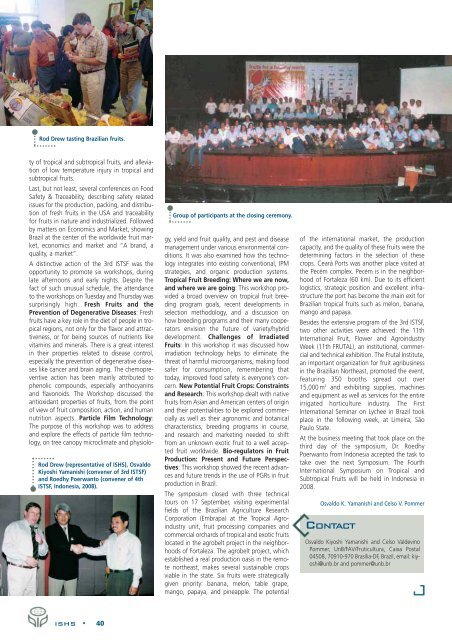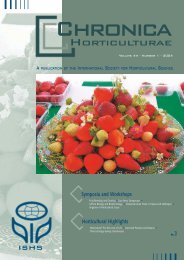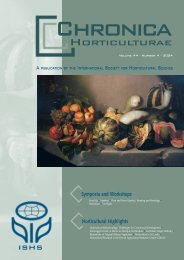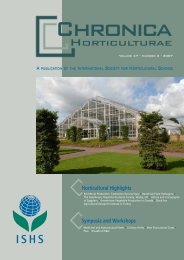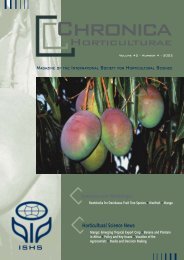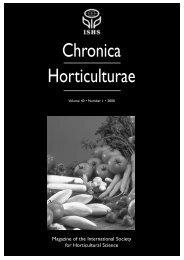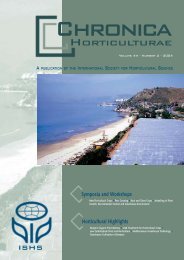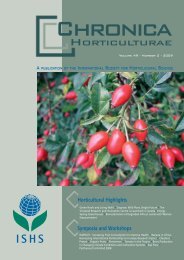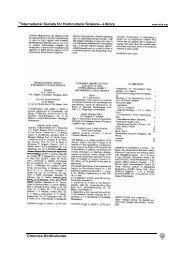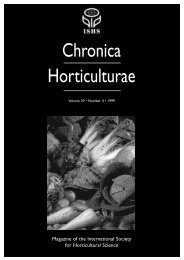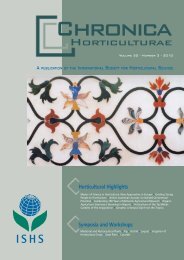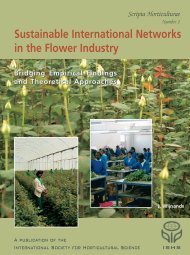Chronica - Acta Horticulturae
Chronica - Acta Horticulturae
Chronica - Acta Horticulturae
Create successful ePaper yourself
Turn your PDF publications into a flip-book with our unique Google optimized e-Paper software.
Rod Drew tasting Brazilian fruits.<br />
Rod Drew (representative of ISHS), Osvaldo<br />
Kiyoshi Yamanishi (convener of 3rd ISTSF)<br />
and Roedhy Poerwanto (convener of 4th<br />
ISTSF, Indonesia, 2008).<br />
Group of participants at the closing ceremony.<br />
ty of tropical and subtropical fruits, and alleviation<br />
of low temperature injury in tropical and<br />
subtropical fruits.<br />
Last, but not least, several conferences on Food<br />
Safety & Traceability, describing safety related<br />
issues for the production, packing, and distribution<br />
of fresh fruits in the USA and traceability<br />
for fruits in nature and industrialized. Followed<br />
by matters on Economics and Market, showing<br />
Brazil at the center of the worldwide fruit market,<br />
economics and market and “A brand, a<br />
quality, a market”.<br />
A distinctive action of the 3rd ISTSF was the<br />
opportunity to promote six workshops, during<br />
late afternoons and early nights. Despite the<br />
fact of such unusual schedule, the attendance<br />
to the workshops on Tuesday and Thursday was<br />
surprisingly high. Fresh Fruits and the<br />
Prevention of Degenerative Diseases: Fresh<br />
fruits have a key role in the diet of people in tropical<br />
regions, not only for the flavor and attractiveness,<br />
or for being sources of nutrients like<br />
vitamins and minerals. There is a great interest<br />
in their properties related to disease control,<br />
especially the prevention of degenerative diseases<br />
like cancer and brain aging. The chemopreventive<br />
action has been mainly attributed to<br />
phenolic compounds, especially anthocyanins<br />
and flavonoids. The Workshop discussed the<br />
antioxidant properties of fruits, from the point<br />
of view of fruit composition, action, and human<br />
nutrition aspects. Particle Film Technology:<br />
The purpose of this workshop was to address<br />
and explore the effects of particle film technology,<br />
on tree canopy microclimate and physiology,<br />
yield and fruit quality, and pest and disease<br />
management under various environmental conditions.<br />
It was also examined how this technology<br />
integrates into existing conventional, IPM<br />
strategies, and organic production systems.<br />
Tropical Fruit Breeding: Where we are now,<br />
and where we are going: This workshop provided<br />
a broad overview on tropical fruit breeding<br />
program goals, recent developments in<br />
selection methodology, and a discussion on<br />
how breeding programs and their many cooperators<br />
envision the future of variety/hybrid<br />
development. Challenges of Irradiated<br />
Fruits: In this workshop it was discussed how<br />
irradiation technology helps to eliminate the<br />
threat of harmful microorganisms, making food<br />
safer for consumption, remembering that<br />
today, improved food safety is everyone’s concern.<br />
New Potential Fruit Crops: Constraints<br />
and Research: This workshop dealt with native<br />
fruits from Asian and American centers of origin<br />
and their potentialities to be explored commercially<br />
as well as their agronomic and botanical<br />
characteristics, breeding programs in course,<br />
and research and marketing needed to shift<br />
from an unknown exotic fruit to a well accepted<br />
fruit worldwide. Bio-regulators in Fruit<br />
Production: Present and Future Perspectives:<br />
This workshop showed the recent advances<br />
and future trends in the use of PGRs in fruit<br />
production in Brazil.<br />
The symposium closed with three technical<br />
tours on 17 September, visiting experimental<br />
fields of the Brazilian Agriculture Research<br />
Corporation (Embrapa) at the Tropical Agroindustry<br />
unit, fruit processing companies and<br />
commercial orchards of tropical and exotic fruits<br />
located in the agrobelt project in the neighborhoods<br />
of Fortaleza. The agrobelt project, which<br />
established a real production oasis in the remote<br />
northeast, makes several sustainable crops<br />
viable in the state. Six fruits were strategically<br />
given priority: banana, melon, table grape,<br />
mango, papaya, and pineapple. The potential<br />
of the international market, the production<br />
capacity, and the quality of these fruits were the<br />
determining factors in the selection of these<br />
crops. Ceará Ports was another place visited at<br />
the Pecém complex. Pecém is in the neighborhood<br />
of Fortaleza (60 km). Due to its efficient<br />
logistics, strategic position and excellent infrastructure<br />
the port has become the main exit for<br />
Brazilian tropical fruits such as melon, banana,<br />
mango and papaya.<br />
Besides the extensive program of the 3rd ISTSF,<br />
two other activities were achieved: the 11th<br />
International Fruit, Flower and Agroindustry<br />
Week (11th FRUTAL), an institutional, commercial<br />
and technical exhibition. The Frutal Institute,<br />
an important organization for fruit agribusiness<br />
in the Brazilian Northeast, promoted the event,<br />
featuring 350 booths spread out over<br />
15,000 m 2 and exhibiting supplies, machines<br />
and equipment as well as services for the entire<br />
irrigated horticulture industry. The First<br />
International Seminar on Lychee in Brazil took<br />
place in the following week, at Limeira, São<br />
Paulo State.<br />
At the business meeting that took place on the<br />
third day of the symposium, Dr. Roedhy<br />
Poerwanto from Indonesia accepted the task to<br />
take over the next Symposium. The Fourth<br />
International Symposium on Tropical and<br />
Subtropical Fruits will be held in Indonesia in<br />
2008.<br />
Osvaldo K. Yamanishi and Celso V. Pommer<br />
CONTACT<br />
Osvaldo Kiyoshi Yamanishi and Celso Valdevino<br />
Pommer, UnB/FAV/Fruticultura, Caixa Postal<br />
04508, 70910-970 Brasília-DF, Brazil, email: kiyoshi@unb.br<br />
and pommer@unb.br<br />
ISHS • 40


